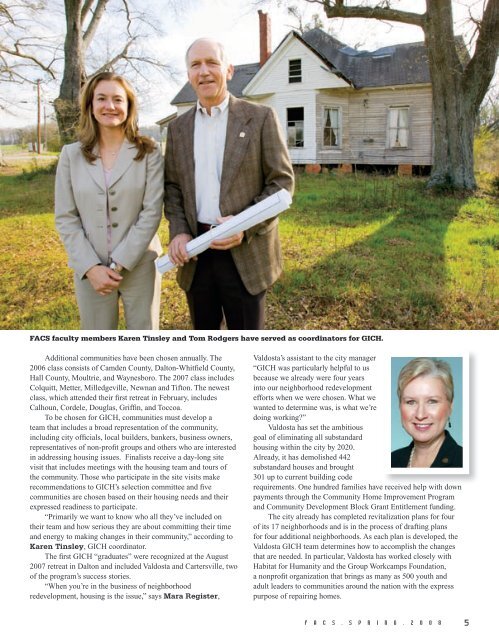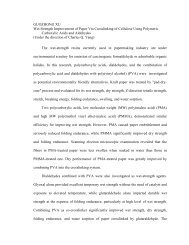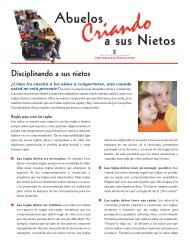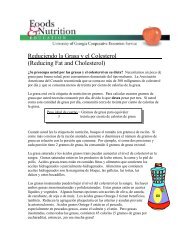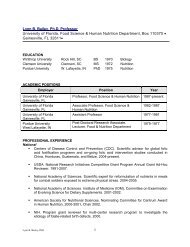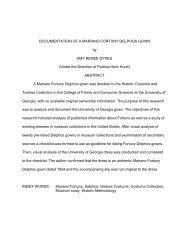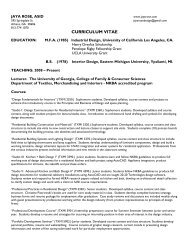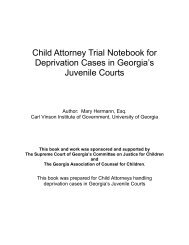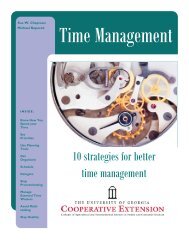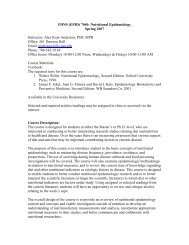G.I.C.H. - University of Georgia
G.I.C.H. - University of Georgia
G.I.C.H. - University of Georgia
Create successful ePaper yourself
Turn your PDF publications into a flip-book with our unique Google optimized e-Paper software.
FACS faculty members Karen Tinsley and Tom Rodgers have served as coordinators for GICH.<br />
Additional communities have been chosen annually. The<br />
2006 class consists <strong>of</strong> Camden County, Dalton-Whitfield County,<br />
Hall County, Moultrie, and Waynesboro. The 2007 class includes<br />
Colquitt, Metter, Milledgeville, Newnan and Tifton. The newest<br />
class, which attended their first retreat in February, includes<br />
Calhoun, Cordele, Douglas, Griffin, and Toccoa.<br />
To be chosen for GICH, communities must develop a<br />
team that includes a broad representation <strong>of</strong> the community,<br />
including city <strong>of</strong>ficials, local builders, bankers, business owners,<br />
representatives <strong>of</strong> non-pr<strong>of</strong>it groups and others who are interested<br />
in addressing housing issues. Finalists receive a day-long site<br />
visit that includes meetings with the housing team and tours <strong>of</strong><br />
the community. Those who participate in the site visits make<br />
recommendations to GICH’s selection committee and five<br />
communities are chosen based on their housing needs and their<br />
expressed readiness to participate.<br />
“Primarily we want to know who all they’ve included on<br />
their team and how serious they are about committing their time<br />
and energy to making changes in their community,” according to<br />
Karen Tinsley, GICH coordinator.<br />
The first GICH “graduates” were recognized at the August<br />
2007 retreat in Dalton and included Valdosta and Cartersville, two<br />
<strong>of</strong> the program’s success stories.<br />
“When you’re in the business <strong>of</strong> neighborhood<br />
redevelopment, housing is the issue,” says Mara Register,<br />
Valdosta’s assistant to the city manager<br />
“GICH was particularly helpful to us<br />
because we already were four years<br />
into our neighborhood redevelopment<br />
efforts when we were chosen. What we<br />
wanted to determine was, is what we’re<br />
doing working?”<br />
Valdosta has set the ambitious<br />
goal <strong>of</strong> eliminating all substandard<br />
housing within the city by 2020.<br />
Already, it has demolished 442<br />
substandard houses and brought<br />
301 up to current building code<br />
requirements. One hundred families have received help with down<br />
payments through the Community Home Improvement Program<br />
and Community Development Block Grant Entitlement funding.<br />
The city already has completed revitalization plans for four<br />
<strong>of</strong> its 17 neighborhoods and is in the process <strong>of</strong> drafting plans<br />
for four additional neighborhoods. As each plan is developed, the<br />
Valdosta GICH team determines how to accomplish the changes<br />
that are needed. In particular, Valdosta has worked closely with<br />
Habitat for Humanity and the Group Workcamps Foundation,<br />
a nonpr<strong>of</strong>it organization that brings as many as 500 youth and<br />
adult leaders to communities around the nation with the express<br />
purpose <strong>of</strong> repairing homes.<br />
F A C S . S P R I N G . 2 0 0 8 5<br />
Photo by Paul Efland


